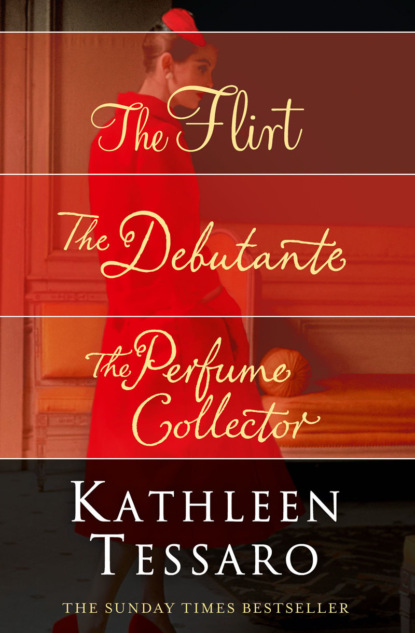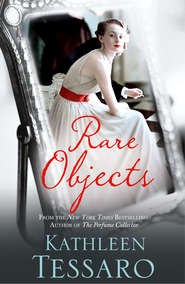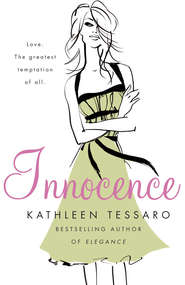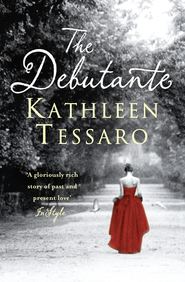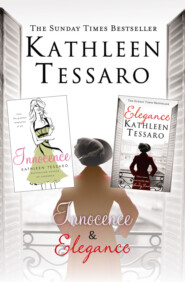По всем вопросам обращайтесь на: info@litportal.ru
(©) 2003-2024.
✖
Kathleen Tessaro 3-Book Collection: The Flirt, The Debutante, The Perfume Collector
Настройки чтения
Размер шрифта
Высота строк
Поля
Wales.
How could they influence a girl so far away?
Celia looked at the Baron. And he at her.
Then they both looked at the fresh face of the man before them, twenty-one if he was a day, eyes wide with terror. He was to set sail for Normandy in the morning. The photo he was holding, its edges worn from too much tender handling, trembled in his hands.
‘She will wait for you.’ The Baron clasped his shoulder. ‘I promise.’
‘But how will you manage it?’ he wanted to know.
‘Well …’
‘We have our methods,’ Celia assured him, tucking the last bit of not-too-stale bread into his rucksack. ‘Trust us.’
Off the young man went, swallowed up into the cold waiting darkness; brave, hopeful again.
And thus began a long series of sleepless nights while the Charleses racked their brains; what could they possibly do to help him?
Not long afterwards, picking through a bombed-out house in Lisson Grove, Celia happened across a slip of paper; nothing more than a single line, written across the back of a calling card.
If I tried to kiss you, would you let me?
The sentiment thrilled of illicit love; just reading it made Celia’s heart race. Tucking it into her pocket, her mind tangled with it; stories, images unfolding. There was a play somewhere, in French … a man who seduces a woman through letters … sexy … teasing … charming.
Somewhere between Marylebone station and Grosvenor Square it came to her – distance was no obstacle if you never saw the lover! What if they seduced the girl through a series of anonymous notes? If they could focus her romantic imagination on a mysterious stranger, perhaps she’d be too distracted to take up a real lover.
The very next day, an assault was launched on the fickle young woman in Wales. She couldn’t imagine who in London was so besotted with her, but the sparse, bold, often poetic sentiments fluttering in her letter box kept her intrigued; too consumed, in fact, to be interested in anyone else.
She had quite a collection by the time the war was over.
And I’m pleased to say that, despite a heady influx of American soldiers, she remained faithful to her noble captain, whose own letters had abruptly stopped after three weeks.
Who never returned.
Who died, in a frozen marsh, under a sky black with the wings of enemy planes, dreaming of a future happiness.
Certain that someone loved him.
The Perfect Plan (#ulink_5ea0527a-496c-5874-8d3b-41fc1bce5a5a)
At Smythson’s stationery shop, Flick purchased several dozen excruciatingly expensive thick, cream-coloured cards and envelopes.
‘Note the quality of the paper,’ she pointed out to Hughie. ‘Everything you use must be of the best possible pedigree, do you understand? Remember, these notes will be the only tangible evidence the subject will have. They’ll be read over and over again, shown to close confidantes, discussed, debated. In short, Hughie, they must be perfect. Always choose cream. Other colours look pedestrian. Never choose distinctive designs. They should be anonymous, so while she should be able to trace the fact that they come from Smythson’s – which, in itself, is always reassuring – she shouldn’t be able to discern anything further.’
They walked back to the office, where Flick referred to a small Rolodex full of cards, each filled with a few lines of text gleaned from poems, lyrics, even fragments overheard in conversation. Here she’d stored hundreds of clues for future use. Finally, she paused and smiled.
‘Perfect!’
Then, unpacking the cards, she slipped on a pair of thin white cotton gloves before taking up a fountain pen.
‘Gosh!’ Hughie observed.
‘You may think I’m being paranoid,’ she said, ‘but you’d be surprised at how many times a woman has resorted to having these notes dusted for fingerprints! Gloves are essential.’
Then in a large, firm hand, not too flowery, not too plain, she wrote across the middle of a blank card.
Blowing on it, she waited for it to dry before slipping it into an envelope and sealing it. Then she addressed it to ‘Olivia.’
‘Just Olivia?’ Hughie asked.
Flick paused thoughtfully. ‘The truth is, you could easily go either way. But I have a feeling that most people are quite deferential to her; that everyone calls her by her full title. I’m chancing that not many strangers would call her by her first name only. She might find that a bit provocative. Now, can you ride a bike?’
Hughie hadn’t been on a bike for quite some time – not since he was a child. So cycling across town had been a harrowing experience. By the time he finally pulled up in front of 45 Chester Square, he was little more than a collection of raw nerves, and sweating profusely, having spent the last quarter of a mile with a growling black Jaguar firmly up his backside.
On shaky legs, he climbed down, leaning the bike against the metal railings and doubling over to catch his breath. He tried to block out the all-too-vivid memory of Hyde Park Corner; pedalling for all he was worth only to find himself sandwiched in by huge, red buses, leaning on their horns, veering across lanes, sweeping him into fresh flows of speeding cars. Hughie had an epiphany: he might easily die at the hands of this woman in the Range Rover on her way to nothing more pressing than a hair appointment and, as long as he didn’t stop the flow of traffic, no one would care or, in fact, blame her.
The door of the house opened.
‘You may not leave that here,’ a haughty voice informed him. ‘Please remove it at once!’
Hughie looked up.
The butler had the knack shared by good domestic staff and public-school masters of instantly rendering those around them inadequate, before they’ve done or said a thing.
Of course, being a public-school boy, this made Hughie feel right at home.
‘Hello!’ He bounded up the steps. ‘Special delivery. By hand, as they say.’
The butler took the envelope, shuddering as he read it out loud. ‘For “Olivia”. Indeed. And who are you?’
‘Just a courier,’ Hughie said. ‘I mean, if anyone asks.’
‘I see. You’re not dressed like a typical courier.’
Hughie looked down at his jeans. ‘All my spandex is in the wash.’
The man sniffed. ‘Yes, spandex can be difficult.’
‘A devil!’
‘Best to air-dry it, don’t you find?’
‘Absolutely.’
‘It’s the same with all the synthetics. And lurex especially. Plastics are the worst.’
Hughie blinked. ‘Definitely.’ He backed down the steps. ‘Well, OK. Thanks.’





